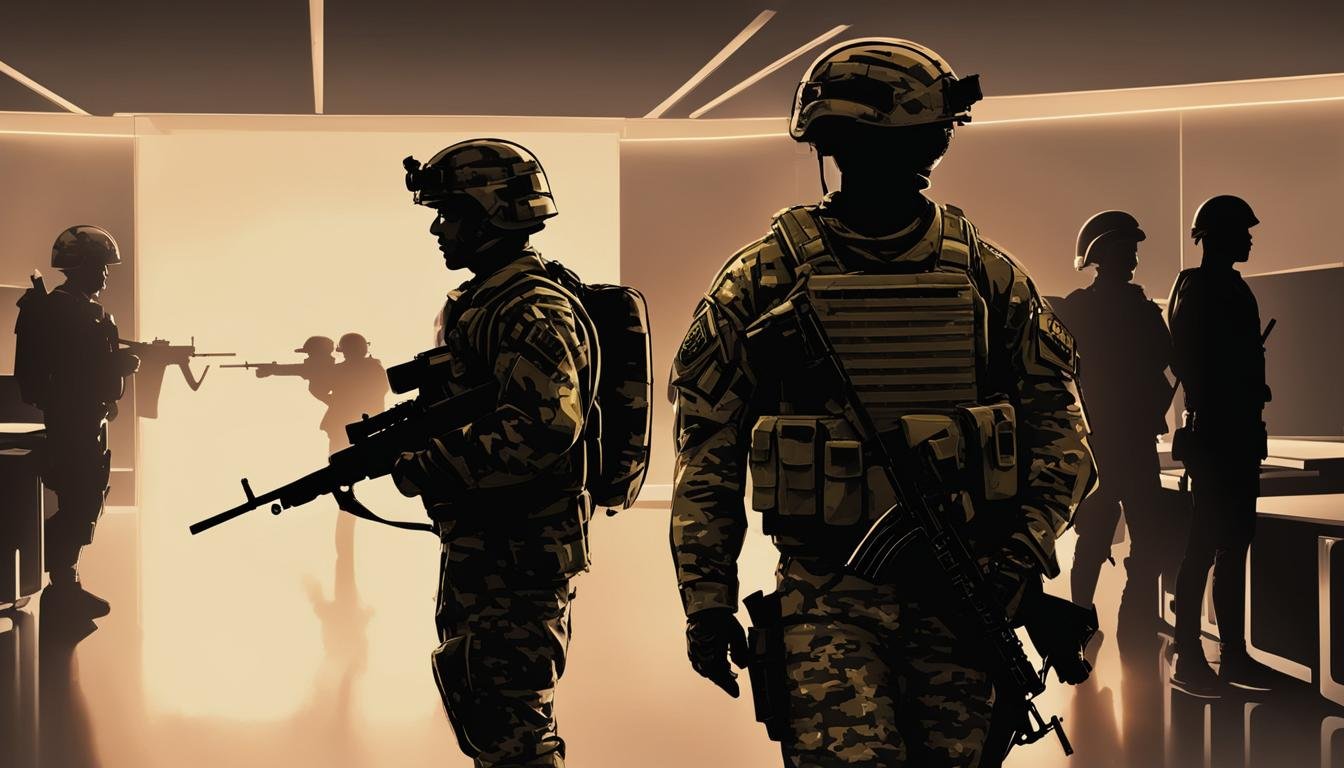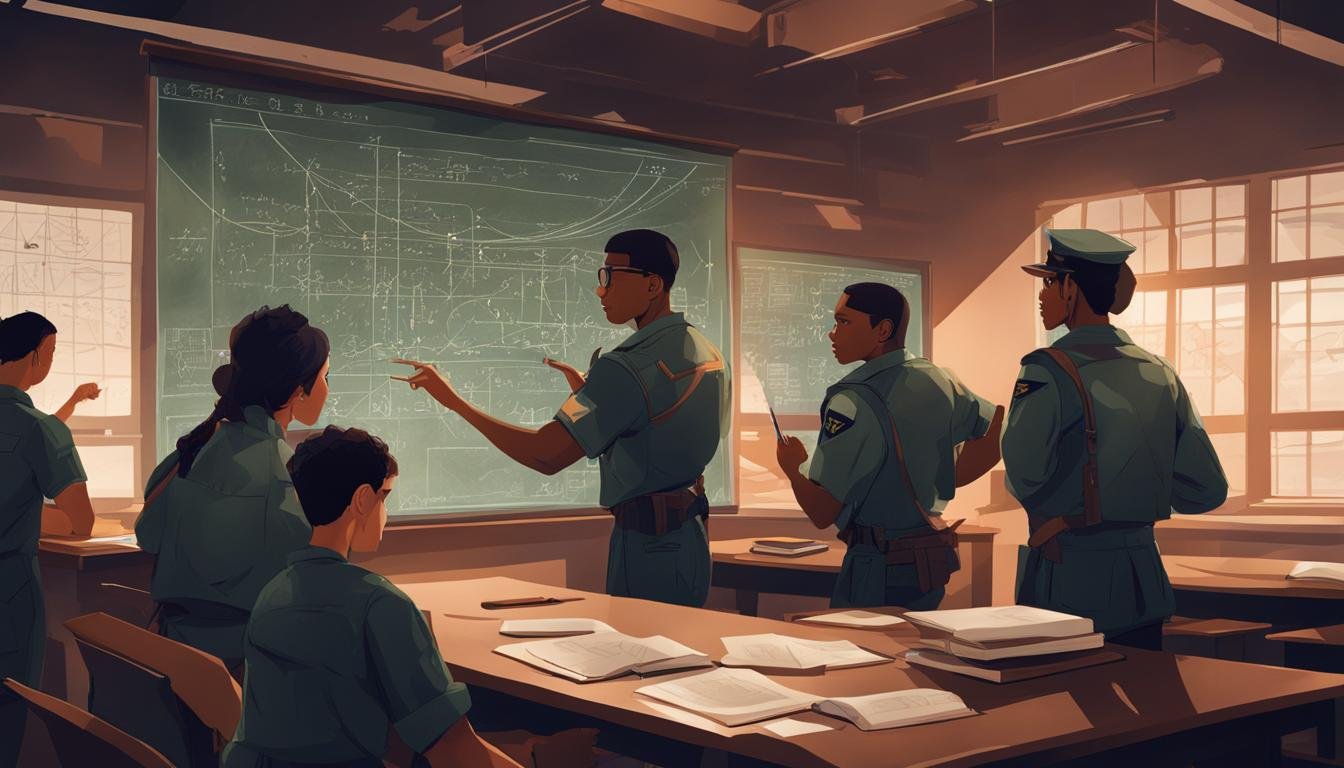Did you know that your military experience can be a valuable asset when pursuing a college degree? By transferring your military training and experience into college credit, you can save time and money while advancing your education. This article will guide you through the process of transferring your military experience to college credits, providing you with the opportunity to fast-track your education in the United States.
Key Takeaways:
- Transferring military experience to college credits can save time and money.
- The Joint Services Transcript and CCAF are important documents for evaluating military experience.
- Maximize your college credits by taking advantage of CLEP exams and ACE military reviews.
- Earning credit for prior learning, including military experience, is possible.
- Work closely with your college or university to navigate the credit transfer process.
Understanding the Joint Services Transcript and CCAF: Your Path to College Credit
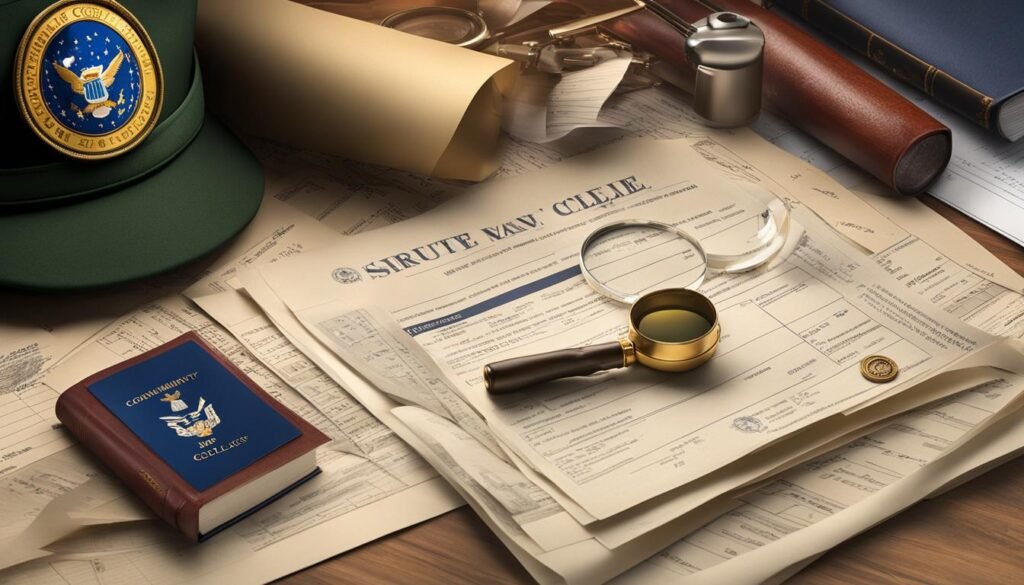
When it comes to transferring your military experience to college credits, the first step is understanding the importance of the Joint Services Transcript (JST) and the Community College of the Air Force (CCAF). These official transcripts play a vital role in documenting your military training, courses completed, and occupational skills, and they form the foundation for evaluating your military experience for college credit.
The Joint Services Transcript (JST) provides comprehensive information on your military course completions, occupations, college-level test scores, and other learning experiences. Accepted by over 2,300 colleges and universities, the JST serves as a valuable tool in demonstrating your qualifications and capabilities to academic institutions. Similarly, the Community College of the Air Force (CCAF) transcript provides a detailed overview of your Air Force training and education. By requesting and submitting these transcripts, you can showcase your military background and expedite the credit transfer process.
“The JST and CCAF transcripts serve as the foundation for evaluating your military experience for college credit.”
Requesting your JST or CCAF transcripts is a straightforward process. Simply follow the instructions provided by the respective organizations or visit their official websites for guidance. Once you have obtained these transcripts, you’ll have the necessary documentation to support your application for college credit based on your military experience. Remember, understanding the importance of the JST and CCAF is the first step toward fast-tracking your education and maximizing your college credits.
| Benefits of Joint Services Transcript and CCAF | Benefits of College Credit for Military Experience |
|---|---|
| Streamlined credit transfer process | Saves time and money in earning a degree |
| Accepted by over 2,300 colleges and universities | Builds upon your military training and experience |
| Documents military course completions and occupations | Provides a competitive edge in the job market |
| Showcases your qualifications and capabilities | Accelerates your degree completion |
Maximizing College Credits: Leveraging Military Training and Testing Programs
If you’re looking to fast-track your education and make the most of your military background, there are several ways to maximize your college credits. By taking advantage of military training and testing programs, you can earn valuable college credits and accelerate your degree completion.
College-Level Examination Program (CLEP) Exams
The College-Level Examination Program (CLEP) offers a unique opportunity for military personnel to earn college credits. By passing one of the 34 CLEP exams, you can earn three or more college credits at thousands of institutions nationwide. What’s even better is that military personnel may take their first CLEP exam for free, with administration fees waived. This can be a significant cost-saving measure while earning credits towards your degree.
Evaluating Military Training through ACE
In addition to CLEP exams, military training and work experience can also be evaluated through the American Council on Education (ACE) military reviews. These evaluations analyze your course materials and on-the-job training to recommend postsecondary educational credit. By leveraging your military training, you can potentially earn additional credits and expedite your degree completion.
By taking advantage of CLEP exams and ACE military reviews, you can maximize your college credits and fast-track your education. It’s important to research and understand the credit transfer policies of your desired institution to ensure you’re making the most of your military training and experience.
Table: Comparing CLEP Exams and ACE Military Reviews
| Program | Benefits |
|---|---|
| CLEP Exams |
|
| ACE Military Reviews |
|
By leveraging these programs and resources, you can make the most of your military training and experience, saving time and money while advancing your education. Take the initiative to maximize your college credits and fast-track your way towards earning a degree.
Evaluating Prior Learning: Credit for Experience Outside the Classroom
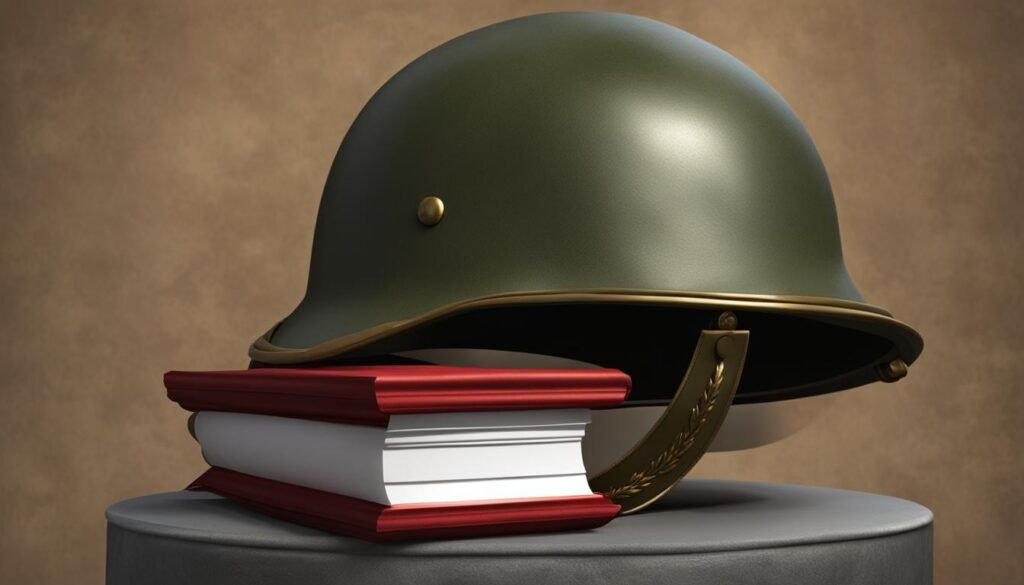
When it comes to earning college credits, your military experience can be a valuable asset that shouldn’t go unrecognized. Many colleges and universities offer evaluations of prior learning experiences, allowing you to earn credit for the knowledge and skills you’ve gained outside the classroom. By leveraging your military experience, you can make substantial progress towards your degree. One way to navigate this process is through the ACE Military Guide, which provides guidance on earning credit for military experience.
The ACE Military Guide serves as a valuable resource for understanding how your military training and occupations can be translated into college credits. It offers detailed recommendations on the credit value of military courses and occupations, helping institutions evaluate the educational equivalencies. Institutions may also conduct military course and occupation reviews to determine the credit recommendations based on the ACE guidelines. By referencing the ACE Military Guide and collaborating with your college or university, you can ensure that your military experience is accurately evaluated for credit transfer.
“Earning credit for your experience outside the classroom can give you a head start towards completing your degree,” says Jane Doe, a military veteran who successfully transferred her military experience into college credits. “It not only saves you time and money but also recognizes the valuable skills and knowledge you’ve gained during your service.”
With the evaluation of prior learning experiences, you have the opportunity to earn college credits for your military training, work experience, and other learning acquired through your service. This can significantly reduce the number of courses you need to complete, saving you time and accelerating your path to graduation. By taking advantage of this credit for prior learning, you can enhance your education and build upon the foundation of skills and knowledge you already possess.
Table: Examples of Credit for Prior Learning
| Military Training/Course | Recommended College Credit |
|---|---|
| Leadership Development Course | 3 credits |
| Technical Training in Electronics | 6 credits |
| Combat Medic Training | 9 credits |
| Information Technology Specialist Occupational Training | 12 credits |
Examples of credit for prior learning can include various military training courses such as leadership development, technical training, combat medic training, and occupational training in specialized fields like information technology. These examples highlight the potential credits you can earn based on your military experience. By working closely with your college or university, you can navigate the evaluation process and maximize the credit transfer for your prior learning experiences.
Summary:
Evaluating prior learning experiences is a crucial step in the credit transfer process for military personnel. By referencing the ACE Military Guide and collaborating with your college or university, you can ensure that your military experience is accurately evaluated for credit transfer. Credit for prior learning acknowledges the knowledge and skills you’ve gained outside the classroom, allowing you to earn college credits and fast-track your degree. With the proper evaluation, your military training and work experience can be recognized and applied towards your educational goals.

When it comes to transferring your military experience into college credits, it’s crucial to navigate the credit transfer process effectively. This involves working closely with your chosen college or university to ensure a smooth transition and maximize your credit transfer opportunities. Here are some key steps to consider:
Evaluating Admission Requirements
Before enrolling in a college or university, it’s important to evaluate their admission requirements and policies regarding credit transfer. Different institutions have varying criteria for accepting transfer credits, so it’s essential to research and find a school that allows you to transfer as many credits as possible from your military training. Some institutions may have specific guidelines for evaluating military experience, so be sure to understand their requirements before applying.
Transcript Evaluation
Having your military transcripts evaluated is a crucial step in the credit transfer process. This evaluation determines the eligibility of your military training and experience for college credits. You will need to submit your Joint Services Transcript (JST) or Community College of the Air Force (CCAF) transcripts to the institution you plan to attend. These transcripts will serve as the foundation for evaluating your military experience and determining the number of credits you can transfer. Working closely with the admissions office or a military enrollment advisor can help ensure a comprehensive evaluation of your transcripts.
Working with Advisors
Connecting with advisors who specialize in military credit transfer can greatly assist you throughout the process. These advisors are knowledgeable about the specific credit transfer policies and procedures of their institution and can provide guidance on which credits are most likely to be accepted. They can also help you explore additional options for earning credits based on your military experience, such as credit for prior learning portfolios, course challenges, and workplace learning. Working with advisors can help streamline your credit transfer and ensure you make the most of your military experience in academia.
Summary:
When navigating the credit transfer process, it’s essential to evaluate admission requirements, have your military transcripts evaluated, and work closely with advisors who specialize in military credit transfer. By following these steps and working collaboratively with your chosen college or university, you can increase your chances of transferring as many credits as possible and fast-track your education with your military background.
Military-Friendly Colleges: Unlocking the Benefits of Your Military Experience in Higher Education
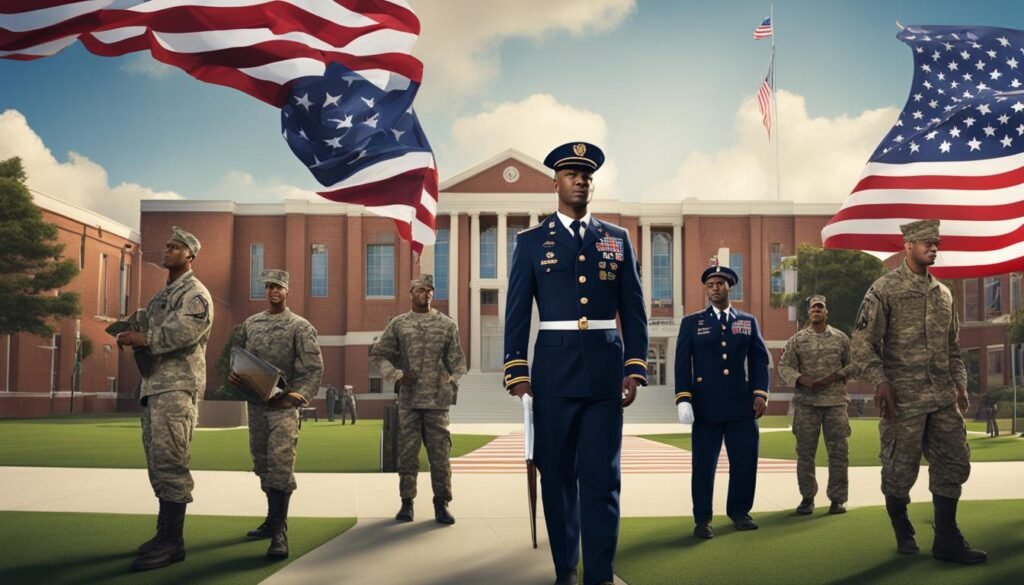
Transitioning from military service to higher education is an exciting journey that offers a range of unique benefits. Military-friendly colleges, such as National University and University of Maryland Global Campus, are dedicated to supporting servicemembers and veterans in their pursuit of education. These institutions recognize the value of your military experience and provide resources, financial aid options, and a welcoming community to help you succeed.
One of the significant advantages of attending military-friendly colleges is their acceptance of the Post-9/11 GI Bill. This comprehensive education benefit can cover tuition costs, provide a housing allowance, and offer a stipend for textbooks and supplies. By utilizing the Post-9/11 GI Bill, you can focus on your studies and alleviate financial burdens, ensuring a smooth transition into higher education.
Moreover, military-friendly colleges understand the unique challenges and experiences of servicemembers and veterans. They offer tailored support services, including veteran resource centers, counseling, career guidance, and networking opportunities. These resources create a supportive environment where you can connect with fellow servicemembers, share experiences, and access the assistance you need to thrive academically and personally.
By choosing military-friendly colleges, you can maximize the benefits of your military experience in higher education. Through the support, understanding, and resources offered by these institutions, you can embark on a new chapter of personal and professional growth, leveraging your military background to achieve your educational goals.
Documentation and Tips: Expediting Your Military Experience Credit Transfer
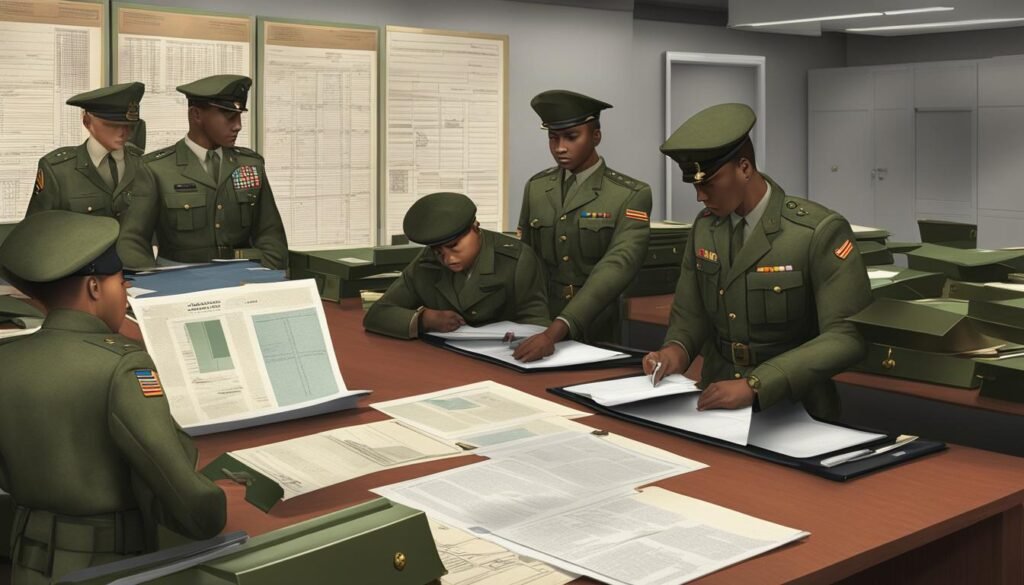
When it comes to transferring your military experience to college credits, proper documentation is crucial. Gathering and submitting the necessary documents can help expedite the credit transfer process. Here’s a checklist of the key documents you’ll need:
- Joint Services Transcript (JST): Request your JST, which provides a comprehensive record of your military training, courses completed, and occupational skills. This official transcript is essential for evaluating your military experience for college credit.
- Community College of the Air Force (CCAF) Transcript: If you’re an Air Force service member, make sure to obtain your CCAF transcript. Similar to the JST, it documents your completed courses and occupational skills.
- Other Training Certificates: Gather any additional training certificates you may have earned during your military service. These certificates can further support your credit transfer evaluation.
Once you have your documentation in order, consider connecting with a military enrollment advisor. These advisors specialize in assisting service members and veterans with the credit transfer process. They can provide personalized guidance and conduct a pre-enrollment evaluation of your eligible credits. Their expertise will help ensure that you make the most of your military experience in academia.
“Proper documentation is essential when transferring your military experience to college credits. By gathering your Joint Services Transcript, CCAF transcript, and any other training certificates, you can expedite the credit transfer process. Don’t hesitate to reach out to a military enrollment advisor for guidance and support.”
Table: Documents for Military Experience Credit Transfer
| Document | Description |
|---|---|
| Joint Services Transcript (JST) | A comprehensive record of your military training, courses completed, and occupational skills. |
| Community College of the Air Force (CCAF) Transcript | Specific to Air Force service members, it documents completed courses and occupational skills. |
| Other Training Certificates | Additional certificates earned during military service to support credit transfer evaluation. |
By proactively preparing and ensuring you have the necessary documentation, you can streamline the credit transfer process and expedite your journey towards earning your degree. Remember, each institution may have its own policies and procedures, so it’s important to stay organized and keep track of any specific requirements.
Expediting your military experience credit transfer is within your reach. With proper documentation and the support of a military enrollment advisor, you can navigate the process with confidence. Take advantage of the resources available to you and make the most of your military background in academia.
Conclusion
As you conclude your journey of transferring your military experience to college credits, you have unlocked a unique opportunity to leverage your military background in education. By understanding the importance of the Joint Services Transcript (JST) and the Community College of the Air Force (CCAF), you have laid the foundation for evaluating and documenting your military training and experience. Maximizing college credits through programs like the College-Level Examination Program (CLEP) and ACE military reviews, you have accelerated your degree completion and saved valuable time and money.
Evaluating prior learning experiences and earning credit for knowledge and skills gained outside the classroom has allowed you to further enhance your college credits based on your military experience. Navigating the credit transfer process by working closely with your college or university, you have ensured that your transcripts are evaluated, and you have explored various options for earning additional credits. With the support of military-friendly colleges and institutions, you can tap into resources and benefits like the Post-9/11 GI Bill to make higher education more accessible.
By leveraging your military experience, you are opening the doors to new possibilities and embarking on a new chapter of personal and professional growth through education. Take pride in the skills and knowledge you have gained in the military and apply them to your academic pursuits. So, fast-track your education and maximize your potential by leveraging your military background as you embrace the exciting opportunities that lie ahead.
FAQ
What is the Joint Services Transcript (JST) and the Community College of the Air Force (CCAF)?
The JST and CCAF are official transcripts that document your military training, courses completed, and occupational skills. The JST is accepted by over 2,300 colleges and universities.
How do I request my JST or CCAF transcript?
Requesting your JST or CCAF transcripts is simple. You can contact the appropriate military branch to request your official transcripts.
How can I maximize my college credits?
One way to maximize your college credits is by passing one of the 34 College-Level Examination Program (CLEP) exams. Military personnel may take their first CLEP exam for free. Additionally, military training and work experience can be evaluated through ACE military reviews.
Can I earn college credit for my military experience?
Yes, many colleges and universities offer evaluations of prior learning experiences, allowing you to earn college credit for knowledge and skills gained outside the classroom, including your military experience.
How does the credit transfer process work?
The credit transfer process involves working closely with your college or university. It is important to have your transcripts evaluated before enrolling to determine your eligibility for admission, scholarships, and transfer credits. Each institution has its policies and procedures for credit transfer.
Are there colleges that specifically support servicemembers and veterans?
Yes, there are military-friendly colleges that offer various resources and support for servicemembers and veterans, such as National University and University of Maryland Global Campus. These institutions accept the Post-9/11 GI Bill and provide financial aid options.
What documentation do I need for the credit transfer process?
To expedite your military experience credit transfer, you will need official transcripts such as the JST and CCAF. It is also advisable to connect with a military enrollment advisor who can guide you through the process and provide a pre-enrollment evaluation of your eligible credits.
How can I leverage my military experience in education?
By transferring your military experience to college credits, you can fast-track your education and leverage your military background to open doors to new possibilities and personal and professional growth.

